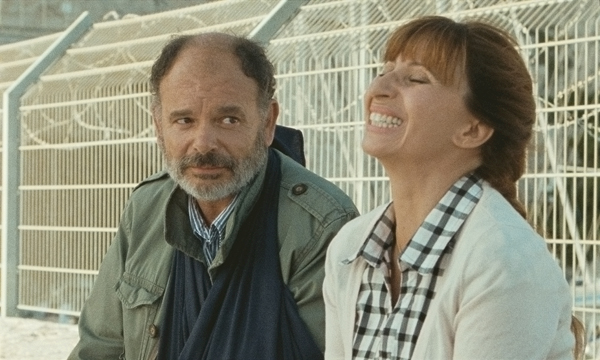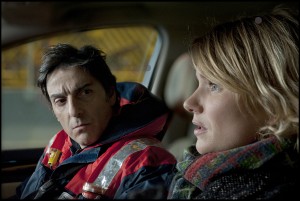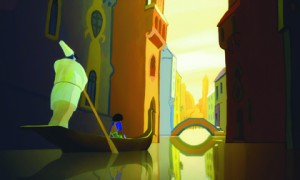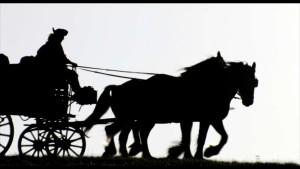
Jean-Pierre Darroussin and Ariane Ascaride in THE SNOWS OF KILIMANJARO (The Film Society of Lincoln Center)
You can talk all you want about the director as the film’s main auteur, but casting remains paramount to a film’s success in most of the entries in New York’s annual Rendez-Vous with French Cinema, presented by the Film Society of Lincoln Center and Unifrance. A film series like this offers a glimpse into a parallel universe of stars. Watch a couple of the films and you’ll connect the dots, following an actor from one role to another, and more times than not, you’ll see the actor playing variations of a type, and unfortunately in several cases, undermining the filmmakers’ intentions.
Many of these films are just as star-driven as any from Hollywood, although on a different scale, no matter how elliptical the storytelling or shaky the camera. The best example is Audrey Tautou in Delicacy, another addition to her roster of slightly-off-kilter and intelligently-written rom-coms. Maybe to downplay the cock-eyed optimist of her most famous role in Amélie, her roles recently have had a counterbalancing darker hue. She played a brittle gold digger in Priceless and turns off her beaming smile and slumps into a deep depression for most of Delicacy’s running time. Stern and with a furrowed brow, she’s more intimidating than endearing. Yet she’s not completely fighting her image. (Is there a French equivalent to “America’s sweetheart”?)
Directors David and Stéphane Foenkinos don’t reinvent the wheel. How could anyone not fall in love while on a date with the Eiffel Tower all aglow in the background? Yet the directors deftly throw the audience several curve balls, deftly shifting the tone from comedy to tragedy to male fantasy (the shlubby guy gets the beautiful girl). Still the film never loses its footing, unlike France’s submission for this year’s best foreign-language film, the scattered mishmash Declaration of War. The style in acting, cinematography, and editing is consistent, though Tautou’s character takes a big U-turn. Based on brother David’s novel, the wistful film will open nationally in March. Look for rising actor and heartthrob Pio Marmaï as her husband and François Damiens out bumbling John C. Reilly.
Rendez-Vous perennials like Catherine Deneuve and Karin Viard are missing in action this year, but festival favorite Daniel Auteuil returns. More than 25 years ago, he starred in the international hits Jean de Florette and Manon of the Spring, adapted from the Marcel Pagnol novels, and this year he not only appears but also makes an assured directorial debut in another pastoral period piece, The Well-Digger’s Daughter, the remake of the 1940 film written and directed by Pagnol. It’s thoroughly old-fashioned, in the best sense—there’s even a discreet cutaway from a love scene. Opening this spring, it deserves to be a sleeper hit. (Treading on sacred ground, Auteuil is currently directing and acting in the remake of Pagnol’s Marseilles Trilogy. The 1930s love-among-the-working-class films made by the writer-turned-filmmaker are among the most beloved of prewar French cinema.)
The casting of the two leads of The Snows of Kilimanjaro will determine your response to the drama, whether you buy the its turn-the-other cheek form of forgiveness or push back from its self-congratulatory (some might even say smug) form of liberalism. Regardless, the original script, inspired by the Victor Hugo poem How Good Are the Poor, hooks the viewer; indifference is impossible. Jean-Pierre Darroussin, another of France’s go-to Everymen, plays Michel, a Marseilles dockworker and union representative. He has decided that the fairest way to determine which shipyard worker will be cut from the workforce is for everyone—including someone with seniority, like himself—to draw a number. He comes out a loser and graciously, if not stoically, accepts premature retirement at 50. Luckily for him, he has a pension and a home bought and paid for.
His sacrifice doesn’t go unnoticed; wife Marie-Claire (the beatific Ariane Ascaride) jokes that it can be tiring living with a hero. She also observes that he’s now less tense (we’ll take her word for it; Darroussin has a calming presence) and now has more time for their grandkids. Rather than tightening their belts, the couple throws their 30th anniversary party out on the dock, inviting one and all, including his former co-workers who were also laid off. Their adult children, friends, and colleagues chip in for a surprise gift for the couple—a trip to Tanzania, with wads of euros to boot. Then wham—the congenial tone takes a hit, spinning the story in a new direction when Michel and Marie-Claire become victims of a violent crime and a betrayal—Marcel knows one of the perps. How they respond to the crime forms the heart of the morality tale and the dividing line for their friends and family, as well as the audience.
But in Robert Guédiguian’s direction of the couple, their soul-searching comes to a too easily-earned resolution. Their self-assurance undercuts the drama, lowering the stakes a bit, because they see the world in black and white, with no grey. And a few other things might stick out of the otherwise methodical movie, like how apparently no one locks their front door in Marseilles and the appearance of a mother-from-hell, who would make anyone look like a saint. But uncannily, the film summons the working-class camaraderie of Pagnol’s films, and not simply because of the waterside setting. (The young actor Pierre Niney steals his scenes as a waiter who knows exactly what ails you—alas, only in the movies. Niney also turns up as the star in 18 Years Old and Rising, also screening. He already has the makings of a charming and goofy comedian.)

Ivan Attal and Sophie Quinton in 38 WITNESSES (The Film Society of Lincoln Center)
Acting throws off another film, 38 Witnesses, inspired by the case of Kitty Genovese, the Queens, New York woman brutally murdered in 1964. According to the urban legend, 38 of her neighbors heard her screams and did nothing to save her, though according to an expose on the radio program , the facts are much more complicated. Transporting the crime to La Havre, director Lucas Belvaux shoots in a clean style, with crisp blues and greys. Overcast skies have rarely looked this beautiful or menacing. Yet his film’s a little too cool. Star Yvan Attal holds his own as one of the 38 middle-class residents who ignore a young collage student’s piercing screams in the middle of the night, but as his wife, Sophie Quinton’s placid performance’s not hot enough. Her character vacillates from guilt-driven to denial, but her mood swings are just skin deep. She seems stuck in the middle. It’s Pierre’s determination to tell the truth that energizes the film. At least you believe him when he says he’s living a nightmare that will never end.
From a purely historical standpoint, Free Men stands out from the steadily growing examinations of France’s courage and cowardice during the Occupation (which includes the complex Army of Crime, directed by Kilimanjaro’s Guédiguian). Though fictional, the film zeros in on an actual Parisian mosque that saved the lives of the Jews and Resistance fighters hiding in its maze-like basement by issuing counterfeit IDs. However, the saga’s told through the character of an Algerian black marketer-turned Nazi informer-turned hero, played by a lifeless Tahar Rahim, who was used to much better effect in the Oscar-nominated A Prophet. There, Rahir was surrounded by a veteran cast, and his tentativeness was built into that prison film’s machinations. Glumly, he deflates the suspense or drama this time around. He’s so miscast and unable to meet the demands of the role that it’s almost a case of actor abuse. And except for the Nazi uniforms, there’s little indication from the wardrobe of the 1940s time period.

(The Film Society of Lincoln Center)
In the last five years, two French-language films have been up for the Best Animated Film Oscar. Don’t be surprised if Jean-François Laguionie’s beautifully elegant The Painting, with its eye-popping colors, achieves the same recognition. Remember how the live-action characters popped into chalk paintings in Mary Poppins? It’s now reversed: figures in a painting jump out of a canvas, popping in and out other paintings in an artist’s studio, all in search of their creator. The stratified world of the kingdom within the titular painting is made up of Allduns (fully completed and colored figures), Halfies (almost finished), and sketches (well, far from complete). Guess who holds the power? A Romeo & Juliet-like couple—he’s an Alldun, she’s a Halfie—shakes up the palette. Adults will be charmed as much as kids, and the film’s depiction of Venice, awash in orange and yellows, almost rivals the real thing. Most likely this movie would be slapped with a PG or PG-13 rating; kids probably can handle Madam, a voluptuous and nude Matisse-esque woman.

(The Film Society of Lincoln Center)
Last year’s Prix Jean Vigo, the annual prize for an emerging, independent filmmaker, went to Smugglers’ Songs, an immersion into the 1760s. It begins with a bang: a handsome army deserter, wounded by a gun shot, is saved from the crown’s henchmen by a ragtag group of smugglers, the 18th century equivalent of black marketers. He joins their encampment deep in the southern countryside, what’s called a “Smuggler’s Paradise.” From there they peddle clothes, contraband booze, and banned books of the Reformation to remote villages, a few steps away from the corrupt tax officers. Director Rabah Ameur-Zaimeche celebrates the underground, inclusive communal life (there’s even a marquis among the brethren), and free enterprise. One smuggler calls it, “a framework for the republic.” It’s largely a convincing re-creation—from the rudimentary surgery to the rickety carriage rides, where the viewer will feel every bump on the road—though, as a colleague pointed out, the type of artillery in the film’s showdowns had yet to be invented.
Rarely has reading subtitles been a highlight of a film, but you’ll want to linger over The Screen Illusion’s translation, and you don’t have to speak French to pick up the cadences of the rhyming alexandrine couplets. Actor and sometime-director Mathieu Amalric throws the 1636 tragicomedy Le Illusion Comique by Pierre Corneille into the modern age, proving the debaucheries and romantic entanglements of a prodigal son are timeless. Upstaging the high-tech gadgetry, the text is the star, and the film’s another example of an actors’ showcase, where the actions match the words. It’s also one of the few films that should be longer. At a fleeting 80 minutes, Amalric has made deep cuts into Corneille’s long five-act text. He distills the essence of the play, with just enough meat left on the bones.
However, for as many noteworthy films programmed, there were an equal number of misses, most notably The Last Screening, a slice-‘n-dice of Peeping Tom, Psycho, and the 1980 splatterfest Fade to Black. The creepiness wears off, what with repetitive scenes of women being murdered (I lost count) and the over-explanation of why an art-house film projectionist turns into a serial killer. Is this what watching too many movies will do to you? Actor Pascal Cervo evens looks a bit like a blank-faced Anthony Perkins. At least you won’t forget the macabre scenes of the killer attaching severed ears to the glossy stills of Hollywood glamour goddesses.
On the other hand, the series will present a doozy of a centerpiece, the restored version of Children of Paradise (1945), and will feature two huge homegrown box-office hits, The Intouchables and A Gang Story, both to be released by the Weinstein Company, which navigated The Artist to an Oscar success—the first time a largely French production won the Best Picture Oscar. Unfortunately, its win is a fluke. There are only two words of dialogue in the film, and they’re in English. The last and only time a subtitled French-language film has been nominated for the top prize was back in 1938, Grand Illusion.
However diverse the series’ selections, they are only a sampling. There are plenty of French films worthy of the spotlight circling the festival circuit. Mystifyingly, two award-winning films that premiered at Cannes were glaring omitted, The Giants and Heat Wave, and they aren’t scheduled yet to land in New York. Provocative, lively, and incisive, they deserve a place here.
















Leave A Comment